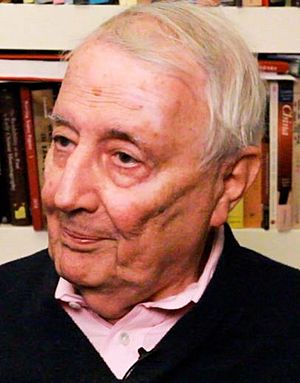Roderick MacFarquhar facts for kids
Quick facts for kids
Roderick MacFarquhar
|
|
|---|---|
 |
|
| Member of Parliament for Belper |
|
| In office 28 February 1974 – 7 April 1979 |
|
| Preceded by | Geoffrey Stewart-Smith |
| Succeeded by | Sheila Faith |
| Personal details | |
| Born |
Roderick Lemonde MacFarquhar
2 December 1930 Lahore, British India |
| Died | 10 February 2019 (aged 88) Cambridge, Massachusetts, U.S. |
| Political party | Labour (before 1981) SDP (1980s) |
| Spouses |
Emily Cohen
(m. 1964; died 2001)Dalena Wright
(m. 2012) |
| Children | 2, including Larissa |
| Alma mater | Keble College, Oxford (BA) Harvard University (MA) London School of Economics (PhD) |
|
Philosophy career |
|
| Institutions | Harvard University School of Oriental and African Studies Columbia University Oxford University |
|
Main interests
|
Modern Chinese history |
Roderick "Rod" Lemonde MacFarquhar (2 December 1930 – 10 February 2019) was an important British expert on China. He was also a politician and a journalist.
Rod MacFarquhar had a very interesting career. He helped start a magazine called China Quarterly in 1959. In the 1970s, he became a Member of Parliament (MP) in the UK. Later, he worked for the BBC. In the 1980s, he became a professor at Harvard University. There, he led the Fairbank Center for Chinese Studies several times. He was most famous for his books about China under Mao Zedong, especially The Origins of the Cultural Revolution and Mao's Last Revolution.
Contents
Early Life and Family
Rod MacFarquhar was born in Lahore, which was part of British India at the time. Today, Lahore is in Pakistan. His father, Sir Alexander MacFarquhar, worked for the government in India and later as a diplomat for the United Nations. His mother was Berenice MacFarquhar.
Rod went to school at Aitchison College in Lahore. He also studied at Fettes College in Edinburgh, Scotland.
Learning and Reporting
From 1949 to 1950, Rod served in the army in Egypt and Jordan. After that, he went to Oxford University. He studied Philosophy, Politics, and Economics and earned a degree in 1953. Then, he went to Harvard University in the United States. In 1955, he got a master's degree in Far Eastern Studies. He learned a lot about China from his teacher, John King Fairbank.
Rod worked as a journalist for newspapers like Daily Telegraph and Sunday Telegraph from 1955 to 1961. He wrote mostly about China. He also reported for the BBC television show Panorama from 1963 to 1965. From 1959 to 1968, he was the first editor of The China Quarterly magazine. He also did research at Columbia University in New York City and the Royal Institute of International Affairs in England. In 1981, he earned his PhD from the London School of Economics.
Becoming a Politician
Rod MacFarquhar wanted to be a Member of Parliament (MP). An MP is someone elected to represent a local area, called a constituency, in the UK government. In 1966, he tried to become an MP for the Labour Party in the Ealing South area, but he did not win. He tried again in 1968 for the Meriden area, but he lost again.
In 1974, Rod was chosen to run for the Belper area. This time, he won the election and became an MP for the Labour Party.
As an MP, Rod was seen as a moderate, meaning he held balanced views. He sometimes disagreed with his own party. For example, he voted against the government on some issues. He also worked as a special assistant to a government minister, David Ennals. Rod was also part of a special committee that looked into science and technology.
After Being an MP
In 1978, Rod MacFarquhar resigned from his assistant role because he voted against the government. In the 1979 election, he lost his seat in Parliament by a small number of votes. After that, he went back to working in universities and broadcasting.
He stayed interested in politics. His moderate views made him feel less comfortable in the Labour Party. In 1981, he joined the Social Democratic Party. In the 1983 election, he tried to win the South Derbyshire seat, which included most of his old area. He came close to winning, but a Conservative candidate won easily.
Later Academic Work
After leaving Parliament, Rod MacFarquhar continued his work as a scholar. He was a research fellow at the Woodrow Wilson International Center for Scholars in Washington D.C. from 1980 to 1981.
From 1986 to 1992, he was the Director of the Fairbank Center for Chinese Studies at Harvard University. This center is very important for studying China. He became a professor of History and Political Science at Harvard.
Rod was a leading expert on Chinese politics. He studied the history of the People's Republic of China from its beginning through the Cultural Revolution. His book, The Origins of the Cultural Revolution: The Coming of the Cataclysm 1961-1966, won an award in 1999.
He wrote or contributed to over 140 books and articles. These works are available in many libraries around the world.
Personal Life
Rod MacFarquhar married Emily Cohen in 1964. She was also a journalist and a scholar of East Asian studies. They had two children: a writer named Larissa MacFarquhar and an economist named Rory MacFarquhar. Rory worked as a policy adviser for the Obama government in the US. Emily passed away in 2001. In 2012, Rod married his second wife, Dalena Wright, who is a scholar of foreign policy.
Rod MacFarquhar died on 10 February 2019, in Cambridge, Massachusetts. He was 88 years old and passed away from heart failure.
 | Chris Smalls |
 | Fred Hampton |
 | Ralph Abernathy |

